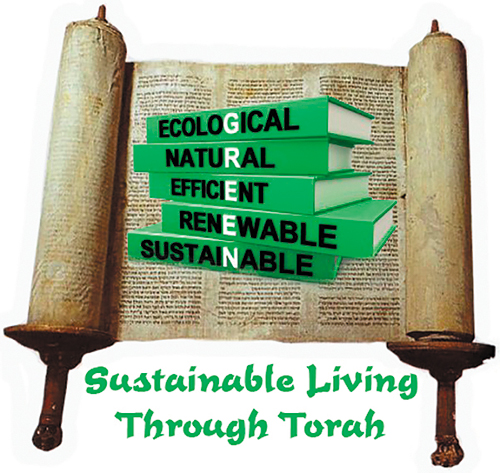
Sustainability is generally defined as utilizing resources to meet the needs of the present without compromising the ability of future generations to meet their own needs. Sustainable products and buildings meet the triple bottom-line of environment, social equity and economics (sometimes referred to as planet, people and profit).
The primary Torah source dealing with sustainability is bal tashchit, literally, do not waste. Derived from the laws prohibiting the destruction of fruit trees in a wartime siege, the principle was extended to include all wanton destruction and is provides a basis for limiting our use of natural resources. Other principles that come into play include the prohibitions of causing unnecessary pain to animals and creating a nuisance (such as noxious odors or noise). Even the approach that the world was created for our benefit does not permit us to destroy that which God gave us, nor to create a legacy of problems to future generations. We must balance our needs with those of others, present and future. This is the essence of sustainability.
How do we apply the general principle to specific issues? Building a house, buying a car, purchasing food or household goods—how far are we obligated to go to avoid bal tashchit? And even if we are not obligated to do a specific act (or refrain from one), Torah life is more than simply issur and heter—it is acting in a way consonant with Torah values. One can be a naval birshut hatorah, meticulous in keeping the letter of the law, and yet still be an evil person in the eyes of God and man. For example, while one may be permitted to cut down a tree, some tshuvot suggest that if there are alternatives that preserve the tree, these are certainly preferable.
Just as we are far more strict on kashrut than the law actually requires (despite costing us more), so too when it comes to the environment, where our actions have an impact on others, we can and should act strictly, even if at times it costs us more. The trick is finding the right balance. Fortunately, going green does not always cost more—in fact it often saves substantial money over time.
Unfortunately, with so many different competing factors as to what is considered a sustainable product, it is hard for consumers to make intelligent choices. Further complicating things is that going “green” is seen by many businesses as merely another marketing gimmick to sell goods, leading to exaggerated and even false claims appearing on labels and in advertising. Who can review each and every claim and evaluate which product to buy?
The situation is very comparable to kashrut, and the solution is similar. Just like we rely on third-party organizations to hold companies accountable to certain declared standards, so too with sustainable products. And just like not every kashrut label is equal, and we need to know which are trustworthy, so too with sustainable labeling.
When we shop, we look for quality, price, and (for food) reliable kashrut. But there are other considerations that relate to our values. For many, supporting local businesses (or supporting trade with particular countries) is a value that is reflected in our purchasing choices. Many people are concerned about trade rules or labor conditions in products from certain countries. Many are concerned about labor rights and business ethics in domestic products as well. There are organizations that investigate these issues, just like for kashrut, and provide lists or certification logos to help consumers buy products that accord with their values. And, of course, there are labels for sustainability.
The series of articles that will follow will explore the labels that relate to sustainable purchasing and building, the standards that the labels seek to enforce, and buyers’ guides for common household and business purchases, building products, and foods to help you make more educated decisions when buying or building. It may be a little more work, but it can often save you money, and your grandchildren will thank you for it.
Michael Rogovin is Chair of the Teaneck Environmental Commission and is accredited as a LEED® Green Associate. He consults to homeowners and businesses seeking to make their buildings, operations and lifestyle more sustainable. Contact him at rogovingreenconsulting.wordpress.com
Michael Rogovin









